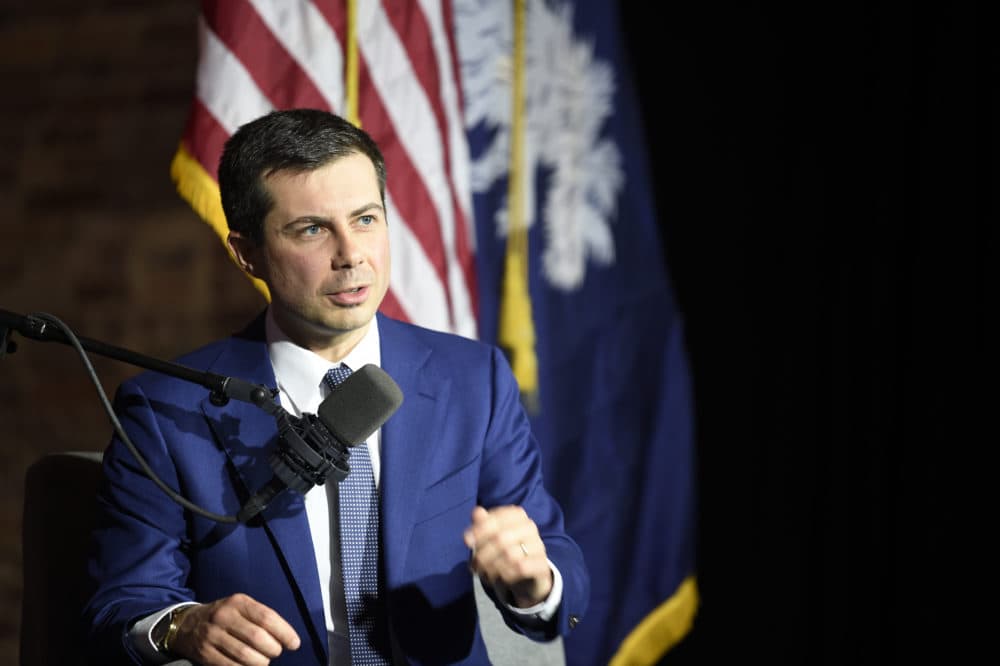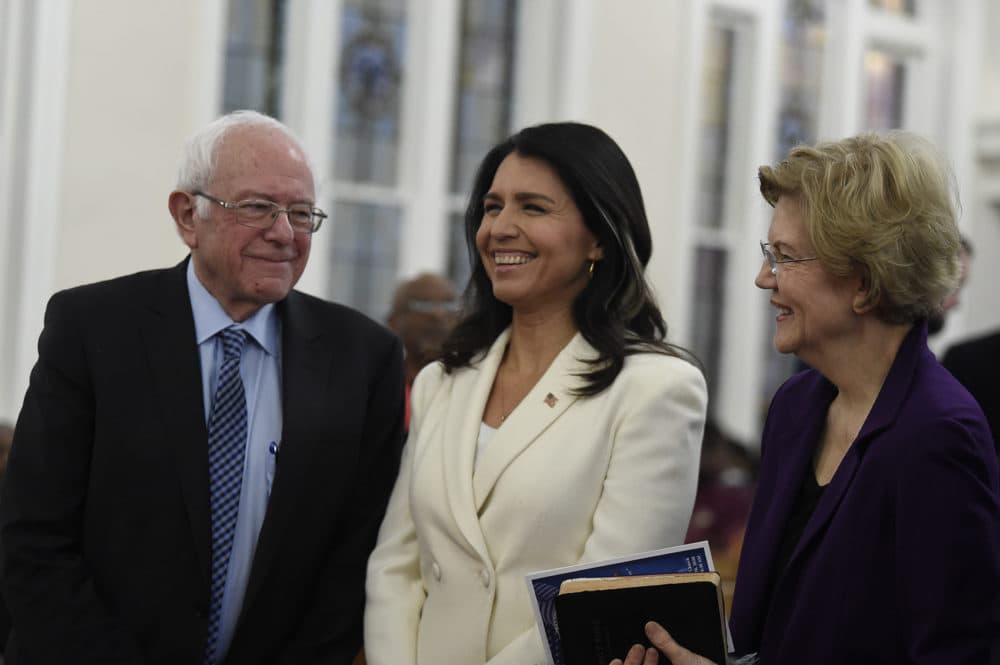Advertisement
Where N.H. Democrats And The 2020 Candidates Stand On Drug Crisis Policies
New Hampshire is among the states hardest hit by the drug overdose crisis. So perhaps it’s no surprise that a majority of voters who plan to vote in the Democratic presidential primary support even the most controversial measures to keep people who use drugs alive and guide them to treatment rather than jail.

Take decriminalization. Pete Buttigieg has a long-standing plan to “eliminate incarceration for drug possession.” A spokeswoman for Joe Biden says that's the former vice president's position, as well. Andrew Yang has a similar position, for opioids, marijuana and psilocybin mushrooms — the latter because his campaigns cites there may be medical benefits. Bernie Sanders would eliminate criminal charges for marijuana and for buprenorphine, a less potent opioid used to treat addiction to stronger drugs. Tulsi Gabbard, Amy Klobuchar and Elisabeth Warren would all decriminalize marijuana.
WBUR’s poll (topline/crosstabs), conducted by the MassINC Polling Group, found 66% of likely Democratic primary voters in New Hampshire agree with the idea of decriminalizing possession of small amounts of drugs. Some call possession a victimless crime. Others support decriminalization because they say poor drug users and minorities are disproportionately charged with drug crimes. Many respondents say decriminalizing drugs may help shift resources from incarceration to treatment.
“The so-called ‘war on drugs’ is a miserable failure,” said Dave Berman from Rumney, N.H. “Regulation, very much like alcohol, I think that would be much more responsible.”
Removing criminal penalties for drug possession is one of five questions we asked of 426 voters between Jan. 17-21 about drug proposals. These questions represent a range of strategies proposed by Democratic hopefuls. New Hampshire voters who expect to cast a ballot in that primary expressed the strongest support, 89%, for requiring that insurers cover drug treatment.
Jody Baronian from Newton, N.H., said she’s watched people in her personal and professional life struggle with addiction.
“When that person is in that moment of wanting to seek help and they’re not able to get it, then we’ve lost an incredible opportunity,” she said. “The number one hindrance is finding an available place and the insurance.”
A spokeswoman for Biden says he supports requiring all insurers to cover drug treatment. Sanders would guarantee treatment under his “Medicare for All” plan. Buttigieg would require coverage of medications that curb or block opioid cravings “and other treatments for addiction.” Amy Klobuchar and Warren both say treatment would be widely available under their respective $100 billion substance use plans.
Advertisement
The poll finds widespread support as well for filing criminal charges against drug companies and executives who allegedly fueled the opioid crisis with misleading or inaccurate claims about the risks of addiction. Thousands of communities across the country have filed civil suits against Purdue Pharma and other manufacturers.
Murali Thiyagarajah, from Concord, N.H., is among the 80% of likely primary voters who support criminal charges.
“Absolutely, absolutely,” he said. “You can just pay the fine and go scot-free … . We have to step up and say that you are criminally responsible.”

Gabbard’s opioid addiction plan focuses on prosecuting pharmaceutical firms and other ways to curb their influence. Biden, Yang, Warren, Klobuchar and Sanders would also pursue criminal charges. Buttigieg calls for holding drug manufacturers accountable for deceptive marketing and other violations, but it’s not clear if he would press for criminal charges.
And finally, we asked New Hampshire Democratic primary voters about specific harm reduction strategies, which are illegal in many areas. Despite that, 70% of respondents support expanding needle exchanges. And 56% approve of supervised consumption sites, where nurses or doctors monitor drug use and step in when needed to prevent an overdose. But many of these voters have reservations about both.
“People shouldn’t go around reusing dirty needles,” Jennifer Cadmus of Troy, N.H., said about needle exchange programs. “They could get an infection and die but is that kind of enabling people? So, I’m a little skeptical of how well it works, but I think it should happen.”
On supervised consumption, Cadmus says “if people can do it safely so they don’t overdose, that’s great, but again, is it enabling them?”
Sanders, Warren, Buttigieg and Yang are all in favor of supervised consumption sites. They also support opening more syringe exchange programs, except for Yang, who hasn’t taken a position.
We reached out to each of the campaigns. If their stance on any of the questions says "did not answer," that’s because we're still waiting for that information from the campaign.
Some New Hampshire voters are surprised that the ongoing problem of drug overdoses and deaths is not getting much attention this election season.
“It drives me insane,” said Baronian, the Newton respondent. “We’re skirting the things that are impacting every single family in this country.”
Public health leaders echo that frustration. Michael Botticelli, director of the Grayken Center for Addiction at Boston Medical Center, said he’s encouraged that most candidates have reasonable, evidence-based plans, but the lack of attention to this issue is discouraging.
“To not address it in a major way is just a deafening silence,” he said.
There are lots of theories about why. In New Hampshire, opioid overdose deaths are on the decline, so there may be less urgency. But meth and cocaine use is up, making the drug crisis more complicated. Discussing solutions in sound bites may be more difficult.
“It’s not a pleasant conversation, it doesn’t leave people with a very good feeling,” said Baronian. “So who wants to include that on their campaign trail and have those difficult complex conversations.”
Other New Hampshire Democrats and some Independents say issues aren’t the priority right now.
“We’ve had this president for awhile," Cadmus said, "people are mainly focusing on whether someone is more electable than him."
This article was originally published on January 24, 2020.
This segment aired on January 23, 2020.
